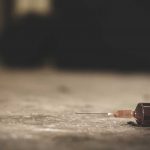Heroin is an opioid drug that causes relaxation and euphoria (extreme joy). It can be snorted, smoked, or injected. Like other opioids, it’s highly addictive.
One of the main signs of heroin addiction (also called heroin use disorder) is physical dependence. That means your body can’t function properly without the drug. When you stop using it, you may experience withdrawal symptoms.
Heroin Withdrawal Symptoms
Heroin withdrawal causes both physical and psychological symptoms.
The most common physical symptoms of withdrawal include:
- shivering
- shaking
- sweating
- yawning
- increased heart rate
- enlarged pupils
- watery eyes
- runny nose
- muscle aches
- abdominal cramps
- nausea and vomiting
- diarrhea
The most common psychological symptoms of withdrawal include:
- anxiety
- irritability
- depression
- trouble sleeping
- trouble concentrating
- intense cravings for heroin
You might not develop all of these symptoms. In addition, you may develop symptoms that are not listed here. That’s because your specific experience of heroin withdrawal depends on personal factors, such as:
- your age
- your sex
- your weight
- your physical and mental health
- how much heroin you use
- how long you’ve been using heroin
Heroin Withdrawal Timeline
The heroin withdrawal timeline varies from person to person.
In general, though, symptoms start within six to twelve hours after your last dose of heroin. Early symptoms often include anxiety, shaking, diarrhea, and muscle aches.
By day three or four, more symptoms appear, such as sweating, nausea, and abdominal cramps. This is usually the most difficult part of withdrawal. Symptoms then start to fade by day seven and often disappear by day ten.
Post-Acute Withdrawal Syndrome
In rare cases, some symptoms linger for months or even a year. This is called post-acute withdrawal syndrome (PAWS). In general, PAWS only includes psychological symptoms, such as anxiety and depression. You face a higher risk of PAWS if you:
- have been using heroin for a long time
- have been abusing other drugs alongside heroin
- stop using heroin suddenly (also called “quitting cold turkey”)
- stop using heroin without professional help
Heroin Detox
Heroin withdrawal symptoms are highly uncomfortable and sometimes life-threatening. That’s why you should never go through withdrawal alone. Instead, seek help at a medical detox program.
Inpatient/Outpatient Detox
You can choose an inpatient detox program, which means you’ll live at the detox center, or an outpatient detox program, which means you’ll regularly visit the detox center while living at home.
Inpatient detox is recommended for people with moderate-to-severe withdrawal symptoms, while outpatient detox may work for people with milder symptoms and stable homes.
Detox Services
Throughout detox, a team of health care providers will keep you as comfortable as possible by monitoring your blood pressure, heart rate, breathing rate, and body temperature. They will also ensure you’re getting enough rest, nutrition, and hydration.
In addition, they may prescribe medications to ease certain opioid withdrawal symptoms, such as sleep aids and anti-nausea medications. Some detox programs also offer services designed to reduce stress, such as massage therapy and acupuncture.
How Long Does Heroin Detox Last?
On average, detox lasts between 5 and 7 days. However, some people need to stay in the program longer, especially if they have pre-existing physical or mental illnesses. Learn more about how long heroin stays in your system.
What Happens After Detox?
After completing medical detox, you’ll likely get referred to a heroin addiction treatment program. This program will help you manage lingering withdrawal symptoms and address the psychological side of addiction.
Most heroin addiction treatment programs include medication-assisted treatment (MAT). MAT uses therapy and medication to reduce your risk of relapse.
Therapy
In therapy, you’ll identify your triggers, which are people, places, feelings, or other things that make you want to use heroin. You’ll then learn ways to cope with them, such as journaling, deep breathing, and spending time with sober friends.
Your therapist can also help you manage any underlying stressors or mental health conditions that made you want to abuse heroin in the first place.
Medication
Alongside therapy, you may receive medications designed to treat opioid dependence. According to the Substance Abuse and Mental Health Services Administration (SAMHSA), these medications include:
- methadone
- buprenorphine
- naltrexone
Methadone is an opioid full agonist. It reduces opioid cravings and withdrawal symptoms by attaching to opioid receptors throughout your body.
Buprenorphine is an opioid partial agonist. Like methadone, it attaches to opioid receptors and reduces opioid cravings. However, it’s not as powerful as methadone.
Naltrexone is an opioid antagonist. That means it blocks the pleasant effects of opioids, which discourages opioid use and helps you avoid relapse.
Other Treatment Services
In addition to MAT, your treatment plan may include interventions such as:
- support groups, where you can connect with other people recovering from drug addiction
- family therapy, where you and your loved ones can learn to manage conflicts and support your long-term recovery from drug abuse
- wellness activities (such as meditation, yoga, and arts and crafts), which can boost your health and take your mind off drug use
To learn more about treatment options for heroin addiction and other substance use disorders, please contact Northeast Addictions Treatment Center. We offer comprehensive, recovery-focused outpatient services to help you stay healthy and heroin-free.
FAQ
Can You Die From Heroin Withdrawal?
Though it’s rare, you can die from heroin withdrawal if:
- you become severely dehydrated. Dehydration can lead to heart failure, seizures, and other life-threatening issues.
- you relapse and take more heroin than your body can handle. Some people overdose because they don’t realize that their tolerance has gone down.
- you use dangerous detox methods. More than one death has resulted from anesthesia-assisted rapid opioid detox (AAROD).
Sources
Written by
Northeast Addition Editorial Team
©2024 Northeast Addition Center | All Rights Reserved
This page does not provide medical advice.







